Academic Year 2014 Commencement Ceremony Held
March 30, 2015
On Thursday, March 26th, the academic year 2014 commencement ceremony took place at Fuchu-no-Mori Art Theater "Dream Hall" in Fuchu city.
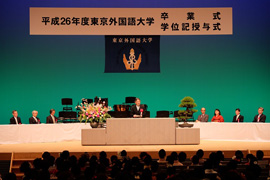
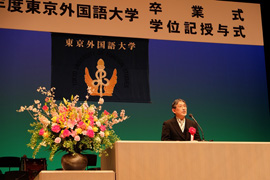
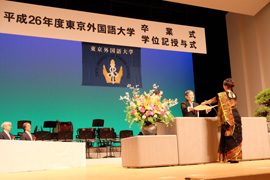
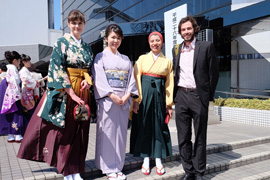
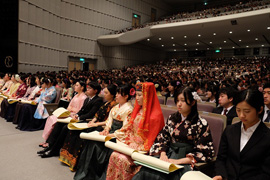
- TUFS Channel "Commencement speech by president Tateishi"
- TUFS Channel "The academic year 2014 commencement ceremony"
Commencement speech by president Tateishi
I, as the president of Tokyo University of Foreign Studies, would like to congratulate all of you who will embark on new chapters in your lives: undergraduates who are going to leave the nest, those who will continue their studies by pursuing master’s degrees, and master’s students and post grad students who will finish your courses and will move forward.
Some students may have studied abroad and will graduate later than your classmates. Those who have finished your course entered in April, 2011. Do you remember what former TUFS president Ikuo Kameyama said in a speech in the 2011 entrance ceremony?
Reflecting on the enormous damage of the devastating Great East Japan Earthquake on March 11th and the ensuing Fukushima nuclear disaster, former president Kameyama’s speech had a strong message for you who were starting university life. “Having witnessed unprecedented events, we are all staggered, shaken, and have strong anxieties about our future.” “However, on the other hand, quite a few of you may realize the significance of life, and feel that simply being alive is itself a miracle and a gift.” “The responsibility we now have is not to forget that.” We always need to keep “a fresh mind and be receptive toward harsh realities and sadness that other may feel”. To do so, “we must strive for happiness and make new discoveries”, and “make ceaseless effort to change ourselves.” These were the messages conveyed by the former president.
I believe that all of you have grown up and developed thanks to the rich university life. Through academic experiences such as classes and practical training, university boat races, the university festival, extracurricular activities, part-time jobs, and studying abroad, you found lots of happiness and you may have been surprised. I hope all of you are confident about actions you took in order to develop and grow as a person from those experiences.
However, I do question whether we have managed to remind ourselves of the tragedy. Immediately after the disaster, bonds and compassion were the words people widely used. However, four years have passed since then, and now it is hard to say whether we have continued to think about those who are in the affected areas or not. This year’s report about the 3.11 earthquake, raised an alarm that memories of the earthquake are fading. Expressions such as “Don’t let it fade,” and “Pass those stories down to future generations”, were repeated.
Now, I would like to express my hope and ask you for a favor as you will be working soon and be a part of society from coming April. You should have an attitude that does not let you forget and where you remember. In addition to that, I would like to ask that all of you strive actively to remember, to recollect, and to never forget. Keeping those attitudes is not so difficult. You may have learned how to do it through the four-year university life and academic life. In short, the way you can achieve that goal is to learn from history.
The 3.11 earthquake taught us a lot. The most essential thing we learned from the tragedy was how we ignored the history of natural disasters and how we were arrogant and overconfident about the development of scientific technologies. The Great Earthquake is called an unprecedented disaster, however, history shows us the earthquake was not unprecedented.
In 1611, four hundred years before 2011, the 1611 Sanriku earthquake occurred.(Sanriku is the area which lie on the northeastern side of the main island of Japan.) Its scale was not serious, but the record said there was huge Tsunami. That strong Tsunami rushed towards the areas that are currently called the Sanriku coast and the Pacific Ocean side of Hokkaido. In Sunpuki, an ancient document which was written on the order of Date Masamune (a regional strongman of the Tohoku-region, in office from 1600-1636) a depiction of a tsunami is found: In the area which Date governed, “The massive Tsunami hit the seacoast and 5000 people were drowned to death”. Namiwake shrine in Sendai city is considered the place where the Tsunami reached, before parting into two and receding. This shrine is located 5km (about 3.1 miles) away from the Pacific Ocean. If we had not forgotten the attitude of learning from history, we could have limited the damage. From this coming April, you will face harsh reality in society. It may be hard to keep remembering or recalling, but I would like to insist again that such an attitude is essential. Furthermore, what you have to remember is not only about your personal experience but also about people in the past and recall how those people recorded things and remembered.
Here is a quote from the 19th century German chancellor Bismarck, “Fools say they learn from experience”. It cannot be helped that personal experiences are fading and memories are often distorted. So, when you encounter accidents and misfortune, please remember the idea of learning from history and dealing with these firmly. I am sure that you learned a lot from the Humanities and Social Sciences in this university and gained an insight into how we can learn from history. Please keep that sense with you even after you become a member of society.
Finally, I have two favors to ask of you. The first one is this: Tokyo University of Foreign Studies has proudly been leading Japanese universities’ globalization. Based on its history, we developed the Super Global University Project (a funding project by the Ministry of Education, Culture, Sports, Science, and Technology). Our framework was successfully adopted under the name of Global Traction Type. (This type of funding is for innovative universities that lead the internationalization of Japanese society based on continuous improvement.) Detailed information about our projects is available on our university website. One of our goals is to achieve a 200% study abroad rate, in order to cultivate multilingual global human resources. That is, while students are enrolled in TUFS, they will study abroad at least twice.
To ensure safety and a secure life in overseas, support from our graduates is necessary. We have Tokyo Gaigokai (literally, Tokyo Foreign Language Society), which is an alumni association that aims at strengthening the TUFS brand. The association has more than 50 overseas branches and has promised to support the university’s framework. I would ask you to take part in Tokyo Gaigokai and help your junior fellows become multilingual global human recourses.
The other request is this: After your life becomes easier in terms of finance, please support the TUFS 150th Anniversary Fund. As a Global Traction Type university, we will establish TUFS Global Japan Offices in major partner universities abroad, and will also accept qualified students from Asia, Africa and Latin America to study with us. We will improve pro-Japanese human resources. To make this happen, enhanced scholarship systems and support for students from less well-off families and backgrounds is essential.
Imagine what TUFS will be like in 2023, which is 8 years from now and 150 years since its establishment in 1873. The university will become the hub university for research and education in the international community; receiving financial and physical support from graduates. At the university, which will become a global university, Japanese students and students from abroad will study together and learn from each other. We, faculty members will make efforts, but we hope you will support us for years to come.
I pray for your future success. This concludes my speech. Thank you very much.
